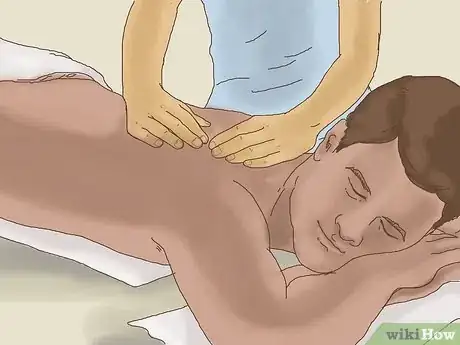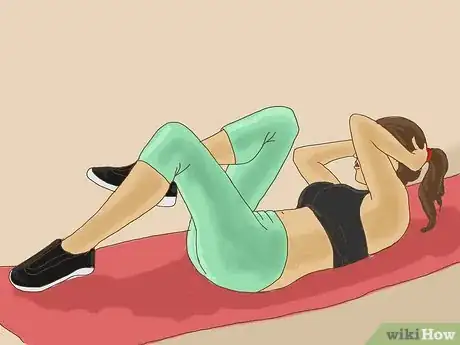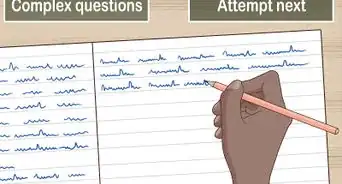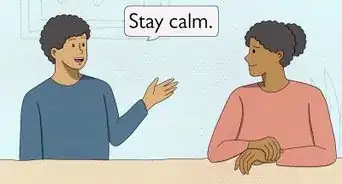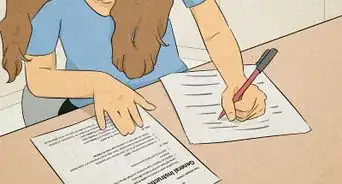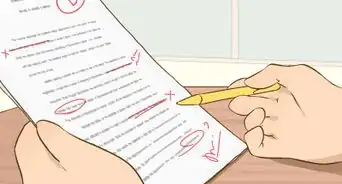This article was co-authored by Klare Heston, LCSW. Klare Heston is a Licensed Independent Clinical Social Worker based in Cleveland, Ohio. With experience in academic counseling and clinical supervision, Klare received her Master of Social Work from the Virginia Commonwealth University in 1983. She also holds a 2-Year Post-Graduate Certificate from the Gestalt Institute of Cleveland, as well as certification in Family Therapy, Supervision, Mediation, and Trauma Recovery and Treatment (EMDR).
There are 9 references cited in this article, which can be found at the bottom of the page.
wikiHow marks an article as reader-approved once it receives enough positive feedback. In this case, several readers have written to tell us that this article was helpful to them, earning it our reader-approved status.
This article has been viewed 142,643 times.
Just taken a test? Do you feel like you've almost certainly done poorly? After taking a crummy test, you may feel upset, worried, frustrated, or down. Doing activities you love, such as listening to your favorite music, spending time with friends, watching something funny on TV, or exercising, can help improve your mood. You can also stay positive by putting the test into perspective and adjusting your study habits so that you do better on the next one.
Steps
Distracting Yourself
-
1Treat yourself to a pick-me-up. Give yourself a manicure or a fantastic massage. Take some time to play your favorite game, or go for a long walk in an area you like. Buy yourself an ice cream or grab a burger with a friend. Just treat yourself to something that will help distract you for a little while after your exam.[1]
-
2Do something that makes you laugh. Whether it be hanging out with your friends, watching a funny TV show or reading a comedic book, find something that can help you laugh. You may not feel like it at first, but once you get into it, you may start to feel better.[2]
- It's perfectly okay if you find it hard to laugh right away. Take some more time to treat yourself, de-stress, and calm down. Then, try humor again. Laughter can be therapeutic on top of being distracting.
Advertisement -
3Listen to music. Find a song or playlist that will help you take your mind off the test for a little while. This is an especially useful distraction right after you've finished the exam. Just put your earphones on and zone out for a little while.[3] .
- Some research suggests that listening to music may help reduce anxiety, enhance performance, and put you in a better mood.
Staying Positive
-
1
-
2Talk to friends. Tell a friend about how you feel.If you can, talk to someone in that class with you. They can offer a perspective on what they found difficult, and how they prepared for the exam. Their understanding and support can go a long way to making you feel better, and you may even get a study tip or two.[5]
-
3Put the test into perspective. Remember that even if you did terrible on this test, it may be only one of several assignments that contribute to your final grade. Take a look at your course syllabus and see how much of your final grade was determined by that test. If you have other marks that can help you balance out that test score, take a breath and relax.[6]
- If the test was a substantial part of your final grade, you may want to talk to your professor or teacher as soon as possible about a re-test or extra credit assignments.
-
4Promise yourself you will do better on the next test. A crummy test can motivate you to change your study habits. Make a list of the things you can do to improve on the next test. Then, put that list into action. If you have the chance to make up for your grade in other assignments, promise yourself that you will make an effort to do better, then put your promise into action.[7]
- If, for example, you didn't study before this test, make a pledge that you will spend 20 minutes a day studying for the next test. Then, when you get home, start reading.
Improving Your Study Habits for Future Tests
-
1Talk to your teacher or professor. Ask if there are other ways of improving your grade or resources available to you that you may not know about. Demonstrate that you care about the material and take the time to discuss difficult concepts with your teacher during their office hours.[8]
- If this test was a major part of your final grade, talk to your teacher about the possibility of a re-test or doing some extra credit work.
- You may also choose to make a standing appointment with your teacher or professor outside of class hours to talk about concepts with which you struggle. Having even 15 minutes of one-on-one time with them every week can help.
-
2Figure out your in-class learning style. Not every student learns the same way. For some, taking and reviewing notes works best. For others, answering questions or doing practice problems better reinforces the materials. Other still may do better seeing a video of the material or drawing out a comic to help them learn. Find the style that works best for you and stick with it.[9]
-
3Study 7-8 bits of information at a time. This is the amount of information your brain can take in at a time. Follow your assigned text or study guide's format: the information you need to learn has already been separated into small chunks. After you finish re-reading or reviewing the main points for each section, take a minute to let your mind process the information before moving on.
- Test yourself a little after each section. Ask yourself 2-3 directed questions, or go over a few flashcards.
- Breaks in between sections of material are a good time to grab a snack, check your email, or run to the bathroom. Give yourself 5-10 minutes between sections to recharge.
-
4Turn each section into a question and quiz yourself. Testing yourself is a smart way of simulating the test-taking experience and making your brain retrieve information. By testing yourself, you'll quickly learn what you've already memorized and what you need to keep studying.
- A great way to test yourself is by turning each section heading into a question and then answering the questions you wrote without consulting your texts.
- Test yourself cumulatively as you go. Don't only reflect on the section you just covered. Instead, ask a question or two from each section you're studying. This will help keep older material fresh in your mind.
-
5Copy problems and race a friend to solve them. This will simulate speedy test-taking conditions and help your brain retrieve information more quickly when test day rolls around. Make sure you and your friend are on a similar level so that both of you benefit from this activity. Do this for 20-30 minutes at least three times on different days before the test.
-
6Engage in positive self-talk right before the test. Anxiety can hamper your performance. Before your test, take a few deep breaths in and out. Then, try telling yourself, “I'm ready for this test. I have studied hard, and I know this information!” This will help calm your nerves and reduce your stress, which in turn can affect your performance.[10]
Expert Q&A
-
QuestionWhat if I did poorly on a placement test? I am really frustrated with myself, and I will never have a chance to take the test again.
 Klare Heston, LCSWKlare Heston is a Licensed Independent Clinical Social Worker based in Cleveland, Ohio. With experience in academic counseling and clinical supervision, Klare received her Master of Social Work from the Virginia Commonwealth University in 1983. She also holds a 2-Year Post-Graduate Certificate from the Gestalt Institute of Cleveland, as well as certification in Family Therapy, Supervision, Mediation, and Trauma Recovery and Treatment (EMDR).
Klare Heston, LCSWKlare Heston is a Licensed Independent Clinical Social Worker based in Cleveland, Ohio. With experience in academic counseling and clinical supervision, Klare received her Master of Social Work from the Virginia Commonwealth University in 1983. She also holds a 2-Year Post-Graduate Certificate from the Gestalt Institute of Cleveland, as well as certification in Family Therapy, Supervision, Mediation, and Trauma Recovery and Treatment (EMDR).
Licensed Social Worker It is time to let it go and move forward! However, there are many placement tests that can be re-taken, especially if there were extenuating circumstances. Sometimes, there is a time frame that has to pass before retaking.
It is time to let it go and move forward! However, there are many placement tests that can be re-taken, especially if there were extenuating circumstances. Sometimes, there is a time frame that has to pass before retaking. -
QuestionWhat if I flunked even when I studied? This has been happening for quite a time now.
 Klare Heston, LCSWKlare Heston is a Licensed Independent Clinical Social Worker based in Cleveland, Ohio. With experience in academic counseling and clinical supervision, Klare received her Master of Social Work from the Virginia Commonwealth University in 1983. She also holds a 2-Year Post-Graduate Certificate from the Gestalt Institute of Cleveland, as well as certification in Family Therapy, Supervision, Mediation, and Trauma Recovery and Treatment (EMDR).
Klare Heston, LCSWKlare Heston is a Licensed Independent Clinical Social Worker based in Cleveland, Ohio. With experience in academic counseling and clinical supervision, Klare received her Master of Social Work from the Virginia Commonwealth University in 1983. She also holds a 2-Year Post-Graduate Certificate from the Gestalt Institute of Cleveland, as well as certification in Family Therapy, Supervision, Mediation, and Trauma Recovery and Treatment (EMDR).
Licensed Social Worker If you are struggling repeatedly, it could be a number of things: (1) you haven't yet identified your learning style, (2) you might ask others how much time the course requires, (3) is it possible that you might have a learning need--like dyslexia, ADHD, or dysgraphia? Consider talking with your parents or your counselor at school, or the Special Needs Office at your institution of learning.
If you are struggling repeatedly, it could be a number of things: (1) you haven't yet identified your learning style, (2) you might ask others how much time the course requires, (3) is it possible that you might have a learning need--like dyslexia, ADHD, or dysgraphia? Consider talking with your parents or your counselor at school, or the Special Needs Office at your institution of learning.
References
- ↑ https://collegeinfogeek.com/failed-test-or-semester/
- ↑ https://pdfs.semanticscholar.org/0253/175e7a1dd0b6b4a5b40fd73457de7d5bdf12.pdf
- ↑ https://www.health.harvard.edu/staying-healthy/music-and-health
- ↑ https://www.nytimes.com/2018/05/02/well/move/even-a-little-exercise-might-make-us-happier.html
- ↑ https://www.psychologytoday.com/us/blog/evolution-the-self/201404/6-virtues-and-6-vices-venting
- ↑ https://www.forbes.com/sites/susantardanico/2012/09/27/five-ways-to-make-peace-with-failure/#4873fa003640
- ↑ https://www.forbes.com/sites/susantardanico/2012/09/27/five-ways-to-make-peace-with-failure/#4873fa003640
- ↑ https://www.collegeraptor.com/find-colleges/articles/tips-tools-advice/importance-office-hours-go/
- ↑ https://teach.com/what/teachers-know/learning-styles/
About This Article
If you’re struggling to cheer up after a crummy test, try distracting yourself by grabbing a bite to eat with a friend or getting a nice massage. Also, while it may seem difficult, try to find a reason to laugh, like through a funny TV show or a book, since this is a great way to calm down and refocus your energy. Alternatively, you could just put on your headphones and listen to some music, as research shows music helps reduce anxiety and put you in a better mood. For our Medical reviewer’s advice on how exercise can help lift your spirits, keep reading.
